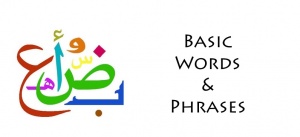Language/Standard-arabic/Vocabulary/Basic-Words-and-Phrases
Welcome to our lesson on Standard-arabic Vocabulary → Basic Words and Phrases! 📚 In this lesson, we will explore some essential words and phrases that will help you communicate effectively in Standard-arabic. As a language teacher with 20 years of experience, I am excited to share my knowledge with you and guide you on your journey to mastering this beautiful language.
After completing this lesson, you may also find it helpful to explore other related topics, such as Standard-arabic religious vocabulary, fish and seafood terms in Standard-arabic, and Standard-arabic vocabulary for countries and continents. These additional resources will further enrich your understanding of the Standard-arabic language and help you become a more confident speaker. 😊
Feel free to edit this page if you want.
If you can provide recordings, follow the steps here: https://polyglotclub.com/wiki/Help/How-to-add-audio-files
or send a message to vincent: https://polyglotclub.com/member/vincent
Greetings[edit | edit source]
- Hello or Welcome/Márhaba, ahlan
- (reply)/áhlayn
- Greetings/As-salám aláykum (peace be with you)
- (reply)/Waláykum as-salám (and to you peace)
- Good morning/Sabáh al-kháyr
- (reply)/Sabáh an-núr (a morning of light)
- Good evening/Misá al-kháyr
- (reply)/Misá an núr
- Goodnight/Tisbáh al-kháyr (wake up well)
- (reply)/Wa ínta min áhlu (and you are from His people)
- Goodbye/Máa Saláma
- How are you?/Káyf hálak? (to a man)/Káyf hálik? (to a woman)
- Fine, thank you/Zayn, al-hámdu, li-la
- Please/Min fádlak (to a man)/Min fádlik (to a woman)
- Thank you/Shúkran
- Thanks be to God/Al-hámdu li-llá
- God willing (hopefully)/Inshá allá
- Yes/Náam
- No/La
Useful phrases[edit | edit source]
- What is your name?/Shú ismak? (to a man)/Shú ismik? (to a woman)
- My name is…/Ismi…
- Where are you from?/Min wáyn inta? (for a man)/Min wáyn inti? (for a woman)
- I am from: England/ána min Ingíltra
- the United States/ána min Amérika
- Australia/ána min Ustrália
- I have 1/2/3 children/Andi walad/waladun/thalatha awlaad
- How do you say . . . in Arabic?/Chayf tegool . . . bil’arabi?
- May I take your photo?/Mumkin sura, min fádlak? (to a female: Mumkin sura, min fádlik?)
- Do you speak English?/Btíhki inglízi?/Teh ki ingleezi?
- I speak English/Bíhki inglízi
- I do not speak Arabic/Ma bíhki árabi
- I do not understand/Ma báfham
- Repeat, once more/Kamán márra
- Do you have…?/ándkum…?
- Is there any…?/Fí…?
- There isn’t any…/Ma fí…
- Never mind/Ma’alésh
- It is forbidden…/Mamnú’a
- What is this?/Shú hádha?
- I want/Uríd
- I like/ana bhib
- I don’t like/Ana ma bhib
- I do not want/Mauríd
- Hurry up/Yalla/bi súra’a
- Slow down/Shwáyya
- Go away!/Imshi!
- What time is it?/Adáysh as-sáa?/kam as-sáa?
- How long, how many hours?/Kam sáa?
- You’re welcome/Afwan
- OK/Tayib/N’zain/Kwayyis
- Not OK/Mish kwayyis
- Come in/After you/Tafdal
- Excuse me/Afwan/lau samaht
- Sorry/Afwan/Muta’assif
- Can I…?/It is possible?/Mumkin?
- I don’t know/Mabaraf
- No problem/Ma fi mushkila
- Perhaps/Mumkin
- Not possible/Mish mumkin
- What time is it?/Kam as saa?
- How much?/Bikaim?
- How many?/Cham?
- What?/Shu?
- What is this?/Shu hadha?
- I’m ill/Ana mareed
Vocabulary[edit | edit source]
General[edit | edit source]
- embassy/safára
- post office/máktab al-baríd
- stamps/tawábi’a
- bank/bank
- hotel/otél/fúnduq
- room/ghurfah
- museum/máthaf
- hospital/mustashfa
- doctor/doktor
- chemist/saydaliyeh
- police/shurta/boulees
- ticket/tádhkara
- passport/jiwáz as-sáfar
- good/kuwáys
- not good, bad/mish kuways
- open/maftúh
- closed/musákkar/múghlik
- old/kadeem
- new/jadeed
- big/kabeer
- small/saghir
- beautiful/zayn
- hot/haar
- cold/bareed
- open/maftuh
- shut/mughlag
Eating out/drinking[edit | edit source]
- restaurant/máta’am
- breakfast/fatour
- lunch/ghadaa
- dinner/ashaa
- food/ákl
- fish/samak
- meat/láhm
- chicken/dajaj
- mutton/ghanam
- milk/halíb
- cheese/jobn
- butter/zibdeh
- eggs/baydh
- bread/khobz
- salad/saláta
- honey/‘asl
- yoghurt/laban
- jam/murabbeh
- dates/balah
- olives/zaytoon
- delicious/ladhidh
- coffee/káhwa
- tea/shay
- beer/beera
- cup/finján
- with sugar/bi súkkar
- without sugar/bidún súkkar
- mineral water/mái ma’adaniya
- glass/gelaas
- bottle/zajaja/botel
- I don’t eat meat/Ana ma bakul laham
- I am a vegetarian/ána nabbáti (for a man)/nabbátiya (for a woman)
- Enough, thanks/Bas, shukran
- the bill/al-hisáb
Getting around[edit | edit source]
- Where…?/Wáyn…? /'ayna.......?
- How far is it to…?/Kam almasafa ila…? / Kam ba’eed min hina
- downtown/wást al bálad
- street/shária
- car/sayára
- taxi/táxi
- shared taxi/servís
- bus/hafila
- aeroplane/tayára
- airport/matár
- petrol, super/benzín
- diesel/mazout
- to/íla
- from/min
- in/fi
- right/yamín
- left/yassar
- straight/gida
- here/hina
- there/hunak
- near/gareeb
- far/ba’eed
- town/madina
- city/madinat
- north/shamaal
- south/janub
- east/sharq
- west/gharb
Days and numbers[edit | edit source]
- today/al yawm
- tomorrow / bokra / ghadaan
- yesterday/ al'ams
- early / mbach’ir/ mubakiraan
- late/ mot’akhir
- day/ yoom / yawm
- night/ layl
- Monday/ al ithnayn
- Tuesday/ ath thalatha
- Wednesday/ al araba’a
- Thursday/ al khamees
- Friday/ al jum’a
- Saturday/ alsebt
- Sunday/ al'ahad
- zero/sifir
- one/wáhid / wahid
- two/ithnayn
- three/taláta
- four/árba’a
- five/khámsa
- six/sítta
- seven/sába’a
- eight/tamánia
- nine/tísa’a
- ten/áshara
- eleven/hidáshar
- twelve/itnáshar
- twenty/áishreen
- twenty-one/wáhid wa áishreen
- twenty-two/ithnayn wa áishreen
- thirty/thalatheen
- forty/arba’een
- fifty/khamseen
- sixty/sitteen
- seventy/saba’een
- eighty/thimaneen
- ninety/tis’een
- one hundred/maya
- one hundred and fifty/may wa khamseen
- two hundred/mayatayn
- three hundred/thaltamaya
- four hundred/rab’amaya
- five hundred/khamsamaya
- six hundred/sittamaya
- seven hundred/sabamaya
- eight hundred/tamnamaya
- nine hundred/tissamaya
- one thousand/alf
Shopping[edit | edit source]
- market/souk
- shop/dukkán / matjar
- money/fulús / mal
- no money/la fulús / la mal
- cheap/rakhís
- expensive (very)/gháli (jídan)
- too expensive/ktir gháli
- receipt, invoice/fatúra, wásl
- How much does it cost?/Adáysh?/Bikaim?
- I like this/Buhíbb hádha
- I do not like this/ma buhíbb hádha
So, let's dive into the world of Standard-arabic vocabulary and start learning some basic words and phrases that will serve as a strong foundation for your language skills!
Other Lessons[edit | edit source]

